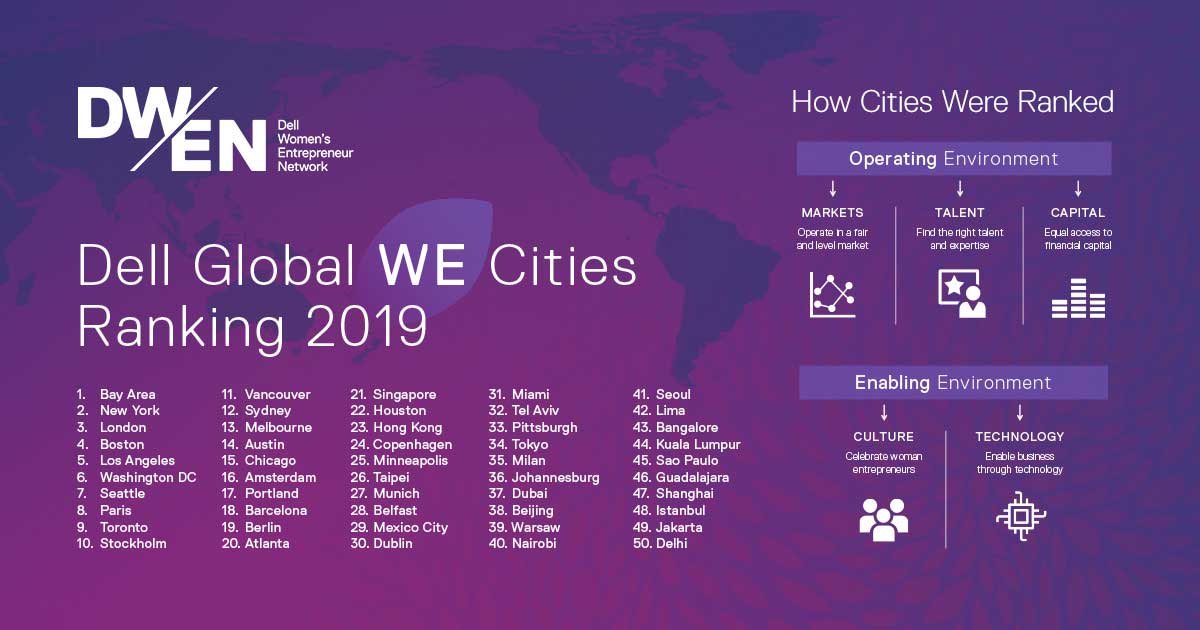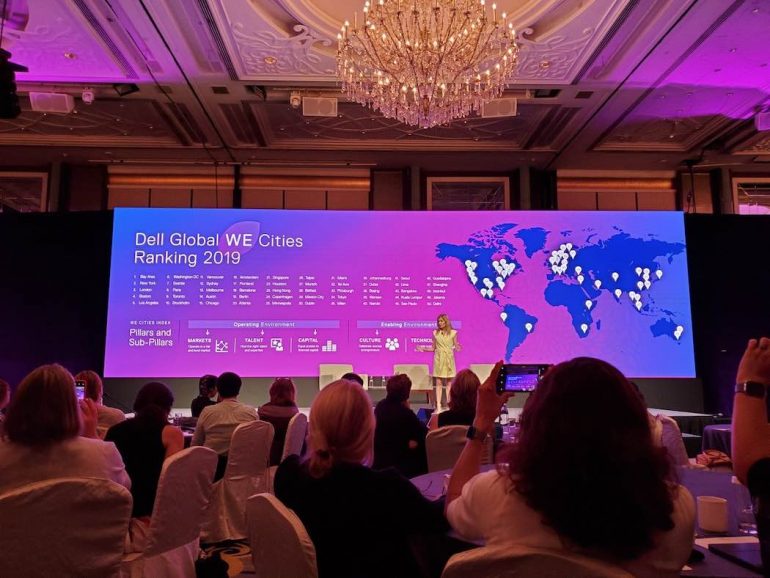Canadian cities have risen in the standings on a new global ranking of the best cities for female entrepreneurs, released last week.
Toronto and Vancouver were the two Canadian cities included in this year’s WE Cities ranking of the top 50 global cities for female entrepreneurs, with Vancouver making number 11 on the list, and Toronto coming in at number nine.
“The good news is that every one of those 50 cities over the last several years, since 2017, has actually increased their score.”
-Karen Quintos, CCO Dell
The 2019 Women Entrepreneur Cities Index, led by Dell in partnership with IHS Markit, ranks 50 cities around the world based on how favourable they are to female entrepreneurs, and their ability to attract and support high-performing female entrepreneurs. The cities are assessed on five key pillars: culture, access to talent, access to technology, access to funding, and markets. Since the last time the ranking was completed in 2017, Toronto has stayed steady at ninth on the list (it was number six in 2016), while Vancouver improved significantly, moving from 26 to 11 (it wasn’t included in the index in 2016).
Dell debuted this year’s WE Cities rankings at its annual Dell Women’s Entrepreneur Network Summit, now in its 10th year. This year’s event is being held in Singapore from July 14 to 16, and the programming focuses on topics like legal trends, access to capital, and doing business in Asia. When opening the event, Dell’s EVP and chief customer officer Karen Quintos discussed the fact that all cities tracked on the WE Cities index showed improvement since the last report.
“The good news is that every one of those 50 cities over the last several years, since 2017, has actually increased their score since the last time we did the research,” Quintos stated .

Vancouver, on the other hand, did not make it into the top 10 for any of the five pillars. The city did see a marked improvement in its ranking from 2017. The report attributes to several rising indicators: the value of VC funds awarded to firms with female executives, the number of projects and dollars raised on crowdfunding sites, the percent of the population with entrepreneurial expertise, and the ratio of women to men with executive experience.
RELATED: 80 women and non-binary people in Canadian tech worth following
In an interview, Dell’s VP and GM of North America small business Erik Day said Vancouver improved significantly on the list for three key reasons. First, an increase in the city’s technology score, which Day noted is becoming more of a tech hub. Second, an improvement on its culture score, with the report citing more female-focused programs, as well as it being a better place to set up a business due to the Trudeau government’s female-friendly policies. Finally, Day pointed to Vancouver’s improved access to talent.
Part of the reason neither Toronto nor Vancouver ranked in the top 10 cities for access to capital could be because female entrepreneurs don’t see themselves represented in the boardroom. Despite female-focused VC funds like Disruption Capital, BDC’s Women in Technology fund, and StandUp Ventures, a report earlier this year from Highline Beta showed that only 15 percent of partners at Canadian VC funds are women, and 85 percent of the money invested into Canadian VC funds went to firms with no female partners.
“[Canada] will continue to advance in these pillars quicker than other countries because you have a supportive government.”
Where Canada lacks in female investors, it has a leg up when it comes to a government that favours gender equality and female entrepreneurship. Dell highlighted the Canadian government’s commitment to gender equality and female entrepreneurship as one of the reasons Canada en large is friendly to female entrepreneurs.
Dell stated that the key goal of the WE Cities index is to impact policy. Based on the findings from this year’s WE Cities index, Dell has developed three key policy recommendations focused on access to and the development of financial and human capital, private and public sector’s role in increasing access to local and global networks and markets, as well as how government and business leaders can help women entrepreneurs thrive in the changing face of technology.
“The reason that I think that WE Cities is going to be huge going forward in a place like Canada is because [Canada] will continue to advance in these pillars quicker than other countries because you [Canada] have a supportive government,” Day said.
While there are no current plans to track other Canadian startup centres like Montreal on the WE Cities index, Day stated that Dell would definitely consider expanding the list in the future.
Image courtesy Ramon Ray via Twitter


